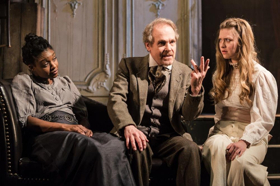Review: THE CHERRY ORCHARD, Union Theatre

![]() Russia then eh? You may have noticed that it's been in he news quite a bit recently - and that's seldom a good thing when that vast country is concerned.
Russia then eh? You may have noticed that it's been in he news quite a bit recently - and that's seldom a good thing when that vast country is concerned.
Phil Willmott has taken an er... axe to Chekhov's original setting and placed the action in 1917, the tumultuous year that saw off the Tsar and his family and thrust the Bolsheviks into power under their ailing strongman, Lenin. (Tsars - real ones or going under titles like General Secretary or President - are never far away in Russia, as the programme, with its shadowy image of a young revolutionary Stalin, all Errol Flynn handsomeness and wild eyes, the iron fists not visible, reminds us).
Does this bold move work? Unfortunately not, the balance that lies at the heart of so much of Chekhov's work diluted by the tensions being split into a triangle (aristocracy - kulaks - proletariat) rather than between the ancien regime and its aspirant middle class challengers. It's that balance that makes the play as written so exquisitely painful (and funny) and I missed it.
That said, there's much to admire in Willmott's pacy adaptation that sees the orchard go from blossom to bludgeon at the speed of Sputnik. As such, it's a fine introduction for anyone who hasn't seen any Chekhov and who might be intimidated by his reputation - and if anyone does get into the Russian master as a result of this production, well, all liberties are forgiven!
Suanne Braun's Ranyevskaya, a ludicrously profligate spendthrift, anchors the play never accepting that her Orchard, indeed, her estate, is doomed until it's too late, history, money and power no match for her paper thin airs and graces. She's not bad nor stupid, just a bit naive in the face of the ruthless nature of those lined up against her. (There's a woman resident a mile or so across the river from this venue about whom one might make the same observation today and not just with regard to Russia!).
The ensemble cast catch much of the comedy and pathos of Chekhov well - Richard Gibson stopping just short of irritating as the damn fool brother Gaev and Lucy Menzies winsomely winning and anything but dumb as the blonde-tressed daughter Anya. Lakesha Cammock impresses as Varya, the Cinderella-like adopted daughter, who gets the job done, but doesn't know where she's going.
It's really with Christopher Laishley's Lopakhin, the son of a serf and now a wealthy kulak, that the conceit unravels. Retaining his business head and piercing modernity from the original play, it's impossible to believe that he would be so easily out-manoeuvred by the Bolsheviks, particularly the dreamy student, Trofimov (Feliks Mathur), whose idealism hardens into action as he rides the tide of history. Both character arcs have, paradoxically, too much retained from the original and too much introduced from this adaptation to convince.
So, following on from Wilmmott's wholly realised Carmen as told by Goya set in the Peninsular War, this experiment isn't quite the full stroganoff - but, nevertheless, more deserving of praising than purging.
The Cherry Orchard continues at the Union Theatre until 7 April.
Photo Scott Rylander.
Reader Reviews

Videos

